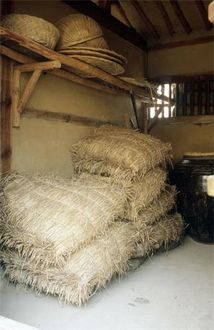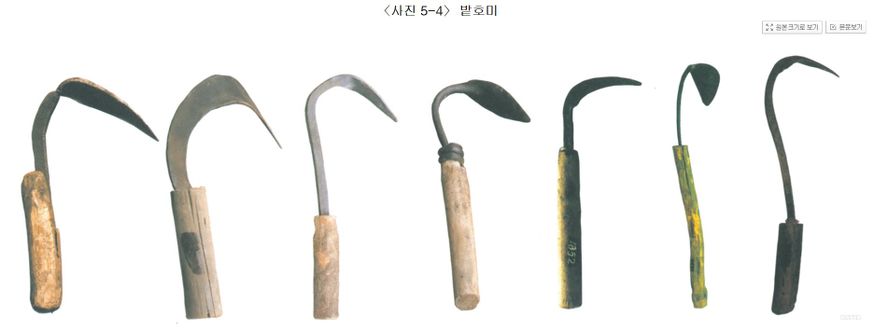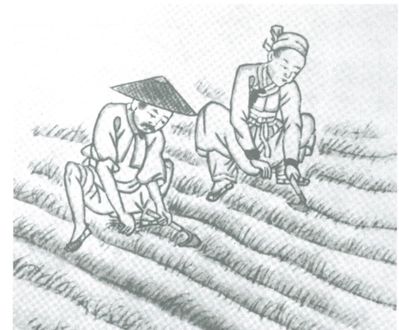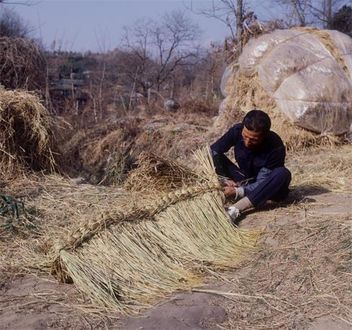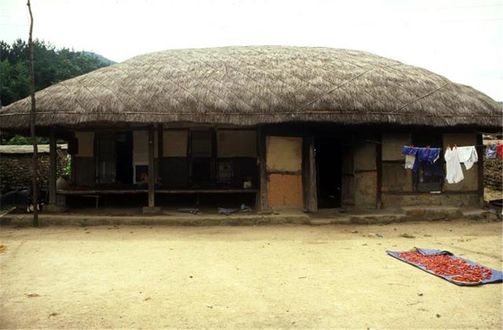"NJ2018 Glossary - Farming Tools"의 두 판 사이의 차이
(→Homi) |
(→Jeomcheon) |
||
| 222번째 줄: | 222번째 줄: | ||
|Hangeul=점천 | |Hangeul=점천 | ||
|RR=Jeomcheon | |RR=Jeomcheon | ||
| − | |MR= | + | |MR=Chŏmch'ŏn |
|Pinyin= | |Pinyin= | ||
|If Common Name=yes | |If Common Name=yes | ||
|Common Name Hanja=飛介 | |Common Name Hanja=飛介 | ||
| − | |Common Name Hangeul= | + | |Common Name Hangeul=날개개 |
| − | |Common Name RR= | + | |Common Name RR=Nalgae |
| − | |Common Name MR= | + | |Common Name MR=Nalgae |
|If Alternate= | |If Alternate= | ||
|Alternate terms= | |Alternate terms= | ||
}} | }} | ||
'''Definition'''<br/> | '''Definition'''<br/> | ||
| + | 이 단어는 이엉을 말한다. 이엉은 짚·풀잎·새 등으로 엮어 만든 지붕재료 또는 그 지붕을 지칭하기도 한다. 여기서는 동일한 재료로 씨앗이 겨울에 얼지 않도록 덮는 용도로 쓰였다.<ref group="Je">Added by Changseop, see [http://dh.aks.ac.kr/~classics/wiki/index.php/Nongsajikseol_-_Preparing_the_seed_grain Preparing the Seed Grain]</ref><br/> | ||
'''Explanation'''<br/> | '''Explanation'''<br/> | ||
'''Multimedia'''<br/> | '''Multimedia'''<br/> | ||
| + | <gallery mode=packed heights=220px> | ||
| + | File:Jeomcheon1.jpg| | ||
| + | File:Jeomcheon2.jpg| | ||
| + | </gallery> | ||
'''Further Reading'''<br/> | '''Further Reading'''<br/> | ||
| + | *[http://encykorea.aks.ac.kr/Contents/SearchNavi?keyword=%EC%9D%B4%EC%97%89&ridx=0&tot=15 한국민족문화대백과사전:이엉] | ||
'''Related Article'''<br/> | '''Related Article'''<br/> | ||
| − | + | <references group="Je"/> | |
===Large scythe with a long handle=== | ===Large scythe with a long handle=== | ||
2018년 6월 13일 (수) 03:45 판
| Nongsa jikseol | |
|---|---|
| Table of Contents | |
목차
- 1 Farming tools
- 1.1 Aged manure
- 1.2 Bunhoe
- 1.3 Cheolchipa
- 1.4 Chopped Weeds
- 1.5 Earthenware jar
- 1.6 Grass (Straw)
- 1.7 Hemp sacks
- 1.8 Hocheon
- 1.9 Homi
- 1.10 Jeomcheon
- 1.11 Large scythe with a long handle
- 1.12 Manure (cow and horse manure)
- 1.13 Mixture of urine and ash
- 1.14 Mokjak
- 1.15 Mokjakpae
- 1.16 Mussle
- 1.17 Night soil
- 1.18 Noemok
- 1.19 Oak stems with leaves
- 1.20 Ox
- 1.21 Pallo
- 1.22 Paro
- 1.23 Pool
- 1.24 Ro
- 1.25 Silkworm droppings
- 1.26 Stable (cow and horse stable)
- 1.27 Stalks
- 1.28 Storage pit
- 1.29 Straw mat
- 1.30 Sump
- 1.31 Trough
- 1.32 Urine
- 1.33 Wooden tub
- 2 Night soil
Farming tools
농사직설에 나타난 농기구는 모두 10종으로, 이에는 따비·쟁기·쇠스랑·써레·끌개[撈]·번지·고무래·곰방메·끌개[縳柴木兩參個]·끌개[木斫背]·끌개[輪木]·오줌구유·호미·낫·도리깨·키·날개·거적·섬·되·말·석·부리망 등 23가지가 포함된다. 이 가운데 땅을 삶는 연장의 종류와 수량은 압도적으로 많아서 39%에 이른다. 더구나 쇠스랑과 써레가 네 번, 번지와 곰방메가 두 번씩 등장하고 끌개도 4종이나 쓰여진 것으로 미루어, 당시에는 흙덩이를 고루 부수는 일에 큰 관심을 기울였음을 알 수 있다. 이러한 사정은 당시의 농업기술과 관련이 깊은 것이다.[Ft 1]
Aged manure
| Basic Info | |||
| • Hanja: 熟糞 | • Hangeul: 숙분 | • RR: Sukbun | • MR: Sukbun |
Bunhoe
| Basic Info | |||
| • Hanja: 糞灰 | • Hangeul: 분회 | • RR: Bunhoe | • MR: Punhoe |
Definition
Bunhoe is an abbreviation for mix of aged manure and urinated ash.[Bh 1]
See the glossary entries for aged manure and mixture of urine and ash.
Multimedia
Further Reading
- Stored Human Urine Supplemented with Wood Ash as Fertilizer in Tomato (Solanum lycopersicum) Cultivation and Its Impacts on Fruit Yield and Quality
- Human Pee With Ash Is a Natural Fertilizer, Study Says
Cheolchipa
| Basic Info | |||
| • Hanja: 鐵齒擺 | • Hangeul: 철치파 | • RR: Cheolchipa | • MR: ? |
| Common Name | |||
| • Hanja: 手愁音 | • Hangeul: 수수음 | • RR: susueum | • MR: ? |
| Alternate English Terms | |||
| • iron-toothed spreader/hoe | |||
Definition
Explanation
Korean(modern): 쇠스랑
A leveling tool.
Multimedia
Further Reading
Related Article
Chopped Weeds
| Basic Info | |||
| • Hanja: 雜草 | • Hangeul: 잡초 | • RR: Japcho | • MR: Chapch'o |
Explanation
Context-the English translation says: Alternatively, first spread chopped weeds between the ridges prior to plowing and sowing.
Further Reading
Earthenware jar
| Basic Info | |||
| • Hanja: 瓮 | • Hangeul: 옹 | • RR: Ong | • MR: Ong |
Definition
한국에서는 대부분 저장 용기로 쓰인 기구이다. 일반 저장 용기와는 다르게 배가 불뚝 튀어나와 있으며 주로 곡물 간장이나 된장을 비롯한 조미료, 술 따위를 저장하는 용도이다. 곡물이 담긴 독은 헛간이나 곳간에 두고 조미료가 담긴 독은 집안에서도 햇볕이 잘 쪼이는 양지바른 곳에 돌로 낮은 단을 쌓아 장독대를 만들어 그곳에 모아둔다.[EJ 1]
Multimedia
Further Reading
- ↑ 한국민족문화대백과사전:독, added by Changseop
Grass (Straw)
| Basic Info | |||
| • Hanja: 草 | • Hangeul: 초 | • RR: Cho | • MR: Ch'o |
| Alternate English Terms | |||
| • straw, weed | |||
Explanation
In the chapter about Plowing the Soil it is translated both as straw and grass.
Passages from the text:
For dry fields, straw should be spread and burned after the first plowing.
For uncultivated land, plow between seventh and eighth (lunar) months and cover the land with grass.
Hemp sacks
| Basic Info | |||
| • Hanja: 布 | • Hangeul: 포 | • RR: Po | • MR: P'o |
Definition
베 주머니
Explanation
The context, from the chapter about Preparing the Seed Grain:
以九穀種各一升各盛布襄, 埋於土宇中。
Multimedia
Further Reading
Related Article
Hocheon
| Basic Info | |||
| • Hanja: 蒿篅 | • Hangeul: 호천 | • RR: Hocheon | • MR: Hoch'ŏn |
| Common Name | |||
| • Hanja: 空石 | • Hangeul: 빈섬/공섬 | • RR: Binseom/Gongseom | • MR: Pinsŏm/Kongsŏm |
| Alternate English Terms | |||
| • Bowl made by Straw (look for correct term in English) | |||
Definition
곡물이나 사료 등을 갈무리하는 데에 쓰는 짚으로 된 그릇.[Ho 1] 볏짚으로 만든 그릇을 지칭한다[Ho 2].
Explanation
In the chapter about Cultivating Rice
is also translated as gongseom.
In 農事直說 it appears as 蒿篅, 호천, but it has various names in different texts: ‘擔, 섬 (農政撮要,농정촬요), ‘空石, 공석’ (山林經濟,산림경제), ‘俵, 셤’(月餘農歌,월여농가). Nowadays it is called 섬 in Korean.[Ho 3]
Multimedia
蒿篅 (호천) (공석) [Ho 4]
Further Reading
Related Article
- ↑ 한국민족문화대백과사전
- ↑ Comment by changseop, see Preparing the Seed Grain chapter.
- ↑ Naver지식백과:섬
- ↑ 한국민족문화대백과사전
Homi
| Basic Info | |||
| • Hanja: 鋤 | • Hangeul: 호미 | • RR: Homi | • MR: Homi |
| Alternate English Terms | |||
| • hoe | |||
Definition
논밭의 김을 매거나 주로 사용하는 한국고유의 연장이다. 우리 호미는 서유구(徐有榘, 1764∼1827)의 『임원경제지』에서도 동서(東鋤, 동쪽나라의 호미)라고 했을 만큼 우리나라에서나 볼 수 있는 연장이었다. 부등변 삼각형인 날의 한쪽 모서리에 목을 이어대고 거기에 자루를 박은 독특한 형태의 연장인 호미는 이미 통일신라시대의 안압지 출토유물에서 확인할 수 있으며(제1편, 호미〈사진 24-3〉), 고려시대의 호미〈사진 5-1〉도 오늘날의 호미와 꼭 같다.[HM 1]
Explanation
Multimedia
Further Reading
- 한국의 농기구, 2001. 6. 25., 어문각
Jeomcheon
| Basic Info | |||
| • Hanja: 苫薦 | • Hangeul: 점천 | • RR: Jeomcheon | • MR: Chŏmch'ŏn |
| Common Name | |||
| • Hanja: 飛介 | • Hangeul: 날개개 | • RR: Nalgae | • MR: Nalgae |
Definition
이 단어는 이엉을 말한다. 이엉은 짚·풀잎·새 등으로 엮어 만든 지붕재료 또는 그 지붕을 지칭하기도 한다. 여기서는 동일한 재료로 씨앗이 겨울에 얼지 않도록 덮는 용도로 쓰였다.[Je 1]
Explanation
Multimedia
Further Reading
Related Article
- ↑ Added by Changseop, see Preparing the Seed Grain
Large scythe with a long handle
| Basic Info | |||
Definition
Explanation
Multimedia
Further Reading
Related Article
Chapter 9
Manure (cow and horse manure)
| Basic Info | |||
| • Hanja: 糞 (牛馬糞) | • Hangeul: 분 (우마분) | • RR: Bun (Umabun) | • MR: ? |
| Alternate English Terms | |||
| • cattle and horse manure | |||
Definition
Explanation
Multimedia
Further Reading
Related Article
소나 말의 똥-from the Korean translation
Mixture of urine and ash
| Basic Info | |||
| • Hanja: 尿灰 | • Hangeul: 요회 | • RR: Yohoe | • MR: Yohoe |
| Alternate English Terms | |||
| • urinated ash, urine and ash fertilizer | |||
Further Reading
- Stored Human Urine Supplemented with Wood Ash as Fertilizer in Tomato (Solanum lycopersicum) Cultivation and Its Impacts on Fruit Yield and Quality
- Human Pee With Ash Is a Natural Fertilizer, Study Says
Mokjak
| Basic Info | |||
| • Hanja: 木斫 | • Hangeul: 목작 | • RR: mokjak | • MR: mokchak |
| Common Name | |||
| • Hanja: 所訖羅 | • Hangeul: 소흘라 | • RR: soheulla | • MR: sohŭlla |
| Alternate English Terms | |||
| • wooden harrow | |||
Definition
Korean(modern): 써래
A farming tool used even out the fields.
Explanation
Multimedia
Further Reading
Related Article
Mokjakpae
| Basic Info | |||
Definition
Explanation
Multimedia
Further Reading
Related Article
Chapter 9
Mussle
| Basic Info | |||
Definition
Explanation
Multimedia
Further Reading
Related Article
Chapter 6
Night soil
| Basic Info | |||
| • Hanja: 人糞 | • Hangeul: 인분 | • RR: inbun | • MR: inbun |
Definition
Explanation
Multimedia
Further Reading
Related Article
Chapter 5.1
Noemok
| Basic Info | |||
| • Hanja: 檑木 | • Hangeul: 뇌목 | • RR: Noemok | • MR: Noemok |
| Common Name | |||
| • Hanja: 古音波 | • Hangeul: 고음파 | • RR: goeumpa | • MR: ? |
| Alternate English Terms | |||
| • (check) | |||
Definition
Explanation
Multimedia
Further Reading
Related Article
Chapter 5.2
Oak stems with leaves
| Basic Info | |||
| • Hanja: 連枝杼葉 | • Hangeul: 련지저엽 | • RR: ? | • MR: ? |
| Common Name | |||
| • Hanja: 加乙草 | • Hangeul: 가을초 | • RR: ? | • MR: ? |
Definition
Explanation
Multimedia
Further Reading
Related Article
Chapter 5.1 and 5.3
가지에 달린 갈잎
Ox
| Basic Info | |||
Definition
Explanation
Multimedia
Further Reading
Related Article
Chapter 6
Pallo
| Basic Info | |||
| • Hanja: 板撈 | • Hangeul: 판로 | • RR: pallo | • MR: ? |
| Common Name | |||
| • Hanja: 翻地 | • Hangeul: 번지 | • RR: beonji | • MR: ? |
| Alternate English Terms | |||
| • (check) | |||
Definition
Explanation
Multimedia
Further Reading
Related Article
Chapter 5
<以板撈【鄕名: 翻地】或把撈【鄕名: 推介】覆種。>
Paro
| Basic Info | |||
| • Hanja: 把撈 | • Hangeul: 파로 | • RR: paro | • MR: p'aro |
| Common Name | |||
| • Hanja: 推介 | • Hangeul: 밀개/추개 | • RR: milgae/chugae | • MR: ? |
| Alternate English Terms | |||
| • (check) | |||
Definition
Explanation
Multimedia
Further Reading
Related Article
Chapter 5
<以板撈【鄕名: 翻地】或把撈【鄕名: 推介】覆種。>
Pool
| Basic Info | |||
Definition
Explanation
Multimedia
Further Reading
Related Article
Chapter 5.2 - to store urine outside the cow stable.
Ro
| Basic Info | |||
| • Hanja: 撈 | • Hangeul: 로 | • RR: ro | • MR: ? |
| Common Name | |||
| • Hanja: 曳介 | • Hangeul: 끌개 | • RR: kkeulgae | • MR: ? |
| Alternate English Terms | |||
| • harrow rake | |||
Definition
A type of rake that was widely used by farmers. Long pine branches would be tied together at one end and loaded with a rock. This would then be dragged over sown fields to cover up the seeds with dirt.
Explanation
Korean(modern): 끌개/끙게
Multimedia
Further Reading
Related Article
Silkworm droppings
| Basic Info | |||
Definition
Explanation
Multimedia
Further Reading
Related Article
누에똥잠사 (Chapter 5.1)
Stable (cow and horse stable)
| Basic Info | |||
| • Hanja: 牛馬廐 | • Hangeul: 우마구 (?) | • RR: Umagu | • MR: ? |
Definition
Explanation
Multimedia
Further Reading
Related Article
<或用木槽, 盛牛馬廐池尿, 漬種其中, 漉出曬乾, 亦須三度。> (chapter 2)
Stalks
| Basic Info | |||
Definition
Explanation
Multimedia
Further Reading
Related Article
Chapter 5.2 (Here check characters for bran and chaff)
Storage pit
| Basic Info | |||
| • Hanja: 土宇 (?) | • Hangeul: 토우 (?) | • RR: to-u | • MR: t'o-u |
Definition
Explanation
Multimedia
Further Reading
Related Article
움집 (as translated in Korean)
<欲知來歲所宜, 以九穀種各一升各盛布襄, 埋於土宇中> (chapter 2)
Straw mat
| Basic Info | |||
Definition
Explanation
Multimedia
Further Reading
Related Article
Chapter 9.
Sump
| Basic Info | |||
| • Hanja: 池 | • Hangeul: 지 | • RR: ji | • MR: chi |
Definition
Explanation
Multimedia
Further Reading
Related Article
<或用木槽, 盛牛馬廐池尿, 漬種其中, 漉出曬乾, 亦須三度。> (chapter 2)
Trough
| Basic Info | |||
Definition
Explanation
Multimedia
Further Reading
Related Article
Chapter 11.
Urine
| Basic Info | |||
| • Hanja: 尿 | • Hangeul: 뇨/요 | • RR: nyo/yo (?) | • MR: ? |
Definition
Explanation
Multimedia
Further Reading
Related Article
<或用木槽, 盛牛馬廐池尿, 漬種其中, 漉出曬乾, 亦須三度。> (chapter 2)
Wooden tub
| Basic Info | |||
| • Hanja: 槽 | • Hangeul: 조 | • RR: jo | • MR: cho |
Definition
Explanation
Multimedia
Further Reading
Related Article
Definition:나무의 재질로 만든 구유/나무구유(as translated in Korean)
Expl:
<冬月, 以瓮或槽埋地中, 要令不凍。>
For this term translation has to be checked again.
What Changseop added: 槽 조 manger
이 글에서는 가축에게 먹이를 주는 그릇을 지칭한다. 특히 소나 말에게 먹이를 주는 그릇이다.[1]
Night soil
![]() Contributor: Ciceo Anca Valentina
Contributor: Ciceo Anca Valentina
- Chinese: 人糞
- Korean: 인분
Night soil is a euphemism for human feces collected from cesspools, privies, pail closets, pit latrines, privy middens, septic tanks, etc. Human excreta may be attractive as fertilizer because of the high demand for fertilizer and the relative availability of the material to create night soil. In areas where native soil is of poor quality, the local population may weigh the risk of using night soil.
Some people refer to human excreta as human manure, and the word "humanure" has also been used. Just like animal manure, it can be applied as a soil conditioner (reuse of excreta in agriculture). Sewage sludge is a material that contains human excreta, as it is generated after mixing excreta with water and treatment of the wastewater in a sewage treatment plant.[2]
Since ancient times, the people of East Asia have traditionally supported a large population by utilizing this natural means of fertilization.[3]
- Additional readings:
